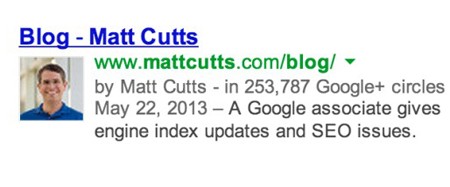Is Google Authorship Making a Comeback?

As many of you know, Google Authorship was launched by Google to give credit to individuals who were influential contributors within a certain niche. Even those who didn't do a lot of writing signed up to take advantage of the image that displayed in the SERPs.
Although many within the digital marketing industry jumped on board, overall adoption rates for the program was relatively low. In Aug. 2014 Google announced that it would no longer be displaying images in the SERPS and that the authorship program was going to be discontinued.

What was great about Authorship?
The Authorship concept sought to connect multiple pieces of online content and link them back to an individual. Paired with the Knowledge Graph and the other updates from Google that aimed to more deeply interconnect online information, there would be a great benefit to niche influencers, had Google gotten it right.
So is it Coming Back?
If you are working hard to make a name for yourself within an industry you will be happy to know that Authorship never went away. I know what you are thinking "Google said the program was discontinued" and although they did get rid of author images in the SERPs, the drive to interconnect information is far from over.
Feeling a little confused?
The Google Authorship program has been terminated but the premise behind it has simply evolved. As you know, Google is dedicated to "improving the quality of search results" (or boosting ad revenue) and for the past couple of years they have reduced the amount of updates they confirm. With that being said; is it a stretch to believe they would withhold information about new programs or ranking metrics? Not at all.
Conspiracy Theory Alert?
Before you chalk this up as another conspiracy theory about what Google is up to, here is why I believe a hybrid of the former Authorship program is still live.
- A few years ago, Google began taking brand mentions and un-linked citations into account when evaluating a website. The premise behind this is that if people are talking about a website, it is more likely to be a quality site or an authority within their niche. The same is true for indviduals.
- Through the implementation of Hummingbird, Google has attempted to decrease its reliance on keywords, shifting its focus to understanding the "big picture" of content, allowing it to identify and return content based upon conversational and voice queries. If it can identify a group of people known for covering specific topics, the results will be better.
- Social signals have ranked very highly on the list of important ranking factors for the past couple of years. We know that Google cannot index a good portion of them; so why are they important? They signify a real and active brand. Remember, "Google wants to return popular sites not make them popular through search." Just as a popular website is discussed, so is a popular person.
What do all three things I just mentioned have in common? They are all attempting to understand who a site should should fit into search results without relying solely upon the traditional on page and link building signals. That does not mean link building is going away anytime soon though!
Before any confusion happens, Matt Cutts said:
"We don't have a version like that that is exposed to the public, but we have run experiments like that internally, and the quality looks much, much worse. It turns out that backlinks, even though there's some noise and certainly a lot of spam, for the most part are still a really, really big win in terms of quality of search results. So we've played around with the idea of turning off backlink relevance and at least for now backlink relevance still really helps in terms of making sure that we return the best, most relevant, most topical search results."
When SEO was in its infancy stages, keyword stuffing was all it took to rank a website. Once that was stopped, the number of links pointing to a website was all that mattered. This progressed into looking at a combination of on-page keyword use and links. Today Google considers content, links, social signals and a host of other factors in determining how to rank a website. In the past, one ranking factor was swapped out for another, today factors simply compound and work together to influence how a website ranks. When you take into account what you already know about Google, the fact that it has stopped being open with information, and the end goal which is to point users to the best content as quickly as possible; does it really seem that far-fetched to think Google is watching individuals within a niche to understand how influential they are within a niche? Nope!
What Can You Do?
Put simply, even though an image no longer displays in the SERPs, Google is still watching individual contributors and determining how they fit into the big picture within a niche. This could be done through the Knowledge Graph or via a platform we have not yet heard about, but it is happening. This deeper understanding of knowledge is something that will continue to evolve and as it does, so will the impact is has on search results. If you want to position yourself ahead of the crowd, here is what you can do:
- Develop a consistent personal brand across the internet that positions you as an expert within a niche, especially on social media.
- Head over to a site like Knowem to find available platforms for yourself and set them up to reflect upon your industry expertise.
- Identify authority sites within your niche and find a way to contribute. Think of this as your "online resume" and you are building your credentials within an industry.
- Engage with other influencers within your niche and closely related niches. Ever heard "birds of a feather flock together"? If you are seen online in groups with other experts in your field, you are more likely to be considered one yourself.
Not So Fast
Before you abandon everything you know about SEO, remember this program is still in its infancy stage and it is more likely to be a supporting factor than to replace the "traditional" ranking factors. In order to succeed online you need to adhere to what you already know about SEO which includes:
- Creating high-value content that solves a problem or offers unique insight.
- Identify those likely to share or link to your content and reach out to them to promote your content.
- Make sure you have a fast website that is mobile-ready and easy for users to navigate.
- Take advantage of social media as a means to distribute your content and engage with followers.
As I dive deeper into the progression of the former "Authorship" program, I will create a follow on post with more actionable tips and insights.
In the meantime, what do you think?
Is Google looking at individual contributors and using that to influence how website content ranks? Let us hear about it below.









